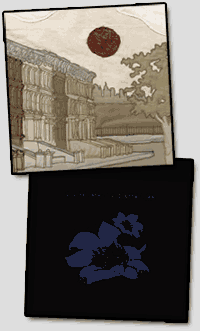
Bright Eyes
I'm Wide Awake, It's Morning / Digital Ash In A Digital Urn (2005)
colin smith
I love punk rock. I love the do-it-yourself ethic, the anti-establishment mentality, the self-sustaining independence. What I don't like is the mentality that if you listen to punk, you must confine yourself to the bands that use three chords or less. So while the fashion punks in their denim, leather, and mohawks spit at an act such as Conor Oberst's Bright Eyes, it's their loss. Oberst has always seemed a staple of DIY; from 4-track recording in basements to a side project (the Desaparecidos) dedicated to attacking consumerism and the expansion of big business. This year Oberst releases two albums, I'm Wide Awake, It's Morning and Digital Ash In A Digital Urn. While the two albums are seperate releases, I am doing it all in one review to compare and contrast the releases.
The decision to release two albums was smart. I'm Wide Awake, It's Morning follows Conor's more traditional folk style, whether it be plucking away alone on an acoustic guitar or singing along with guest vocalist Emmylou Harris. Digital Ash In A Digital Urn was previewed as more "dancy, beat-oriented" music, which terrified me; I absolutely loathe the revival of the 80's dance wave that has infected the underground music scene. Fortunately, each album offers an array of surprises: some good, and some bad.
I'm Wide Awake… starts off with the now traditional spoken word introduction. While it works at first, for those of us that have enjoyed Bright Eyes in the past, this seems almost forced; a neccessary introduction to one of his albums. However, once the music picks up, it's back to the good old days of soft and slow sing-a-longs. "We Are Nowhere And It's Now" and "Train Under Water" are strong examples of what Conor offered on 2001's Lifted… For those old-time fans who want the quivering, more emotive qualities of Fevers And Mirrors, "Landlocked Blues" and "Poison Oak" offer the more metaphorical stylings Oberst seems to have departed from lately.
The only real fault of this album is that it seems to be watered-down Bright Eyes for the masses. Not until the aforementioned "Blues" and "Oak" does the album offer some dynamite tracks that can rival classics such as "Arienette;" "Poison Oak" is easily my favorite track, and a perfect drunken singalong (if you're into that sort of thing). The record's finale borrows from Beethoven's ninth, the massive and marching "Road To Joy," an anti-war declaration of the problems in modern America. While the vocals of the majority of the record have seemed restrained and produced, Conor finally lets loose at the end of the album when the Saddle Creek orchestra explodes, lead by his call, "Well I could have been a famous singer / if I had someone else's voice / but failure's always sounded better / let's fuck it up boys / make some noise!"
Now that we've got standard Bright Eyes covered, forget everything you've ever known about the group except for the beat-hinted track "Lover I Don't Have To Love," from 2001's Lifted… The introduction to Digital Ash In A Digital Urn is "Time Code," consisting of heavy breathing, muffled beats and ambient noises. When the echoed vocals start, the lyrics are more abstract than usual: "Death data intrigue / anthill law / encoded arc / our common cause / drink liquid clocks / til I see God / crystal display / can't turn it off."
Then, heavy beats and I'm reminded of a quieter Nine Inch Nails. While this is probably the most radical departure, it sets up a good pace for the rest of the album. The next two songs, "Gold Mine Gutted" and "Arc Of Time," are just fantastic, showing quite a bit of potential. The album carries on with this same tone - some dark songs, some light, but for the most part, really strong.
"I Believe In Sympathy" is hard to grasp at first, but the ending of the song really makes up for it. Unfortunately, the next two tracks, "Devil In The Details" and "Ship In A Bottle" show the new endeavour isn't all golden - I find myself skipping these more than I do listening to them all the way through. Surprisingly, the reason is not necessarily the music, but rather the writing - it's childish and amateur, something that Oberst is usually far above. "Light Pollution" rescues the disc as my favorite track, an ode to a friend who fought the system and lost. Everything about this song just clicks. The record concludes with "Easy Lucky Free," a pensive and epic track that seems to follow Oberst's train of thought about the changing times; "Don't be a criminal in this police state / you better shop and eat and procreate / you've got vacation days / and you might escape / to a condo on the coast."
Both of these records are strong. I'd put Digital above Morning, simply because it shows Oberst progressing as an artist both lyrically and musically. Unfortunately each of these albums has at least one track that I'd classify as filler - something that I'd never associate with Bright Eyes previously. While the two styles differ enough to merit two different releases, if Oberst had packaged the best songs from each of the two CDs together on one disc, it would easily see the top of many "Best of '05" lists.
I'm Wide Awake, It's Morning:
Digital Ash In A Digital Urn: